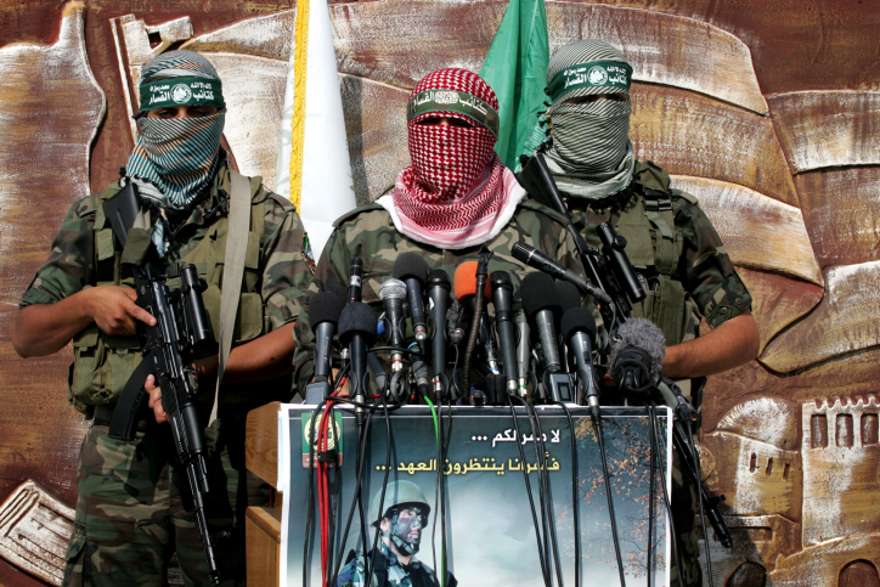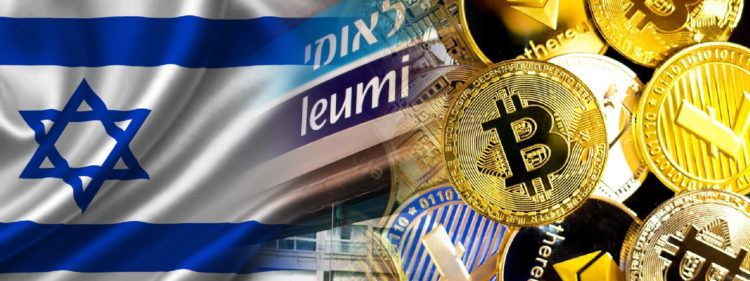
The lobby inside the Tel Aviv Stock Exchange.
Someone Knew: Stock Traders Made Millions
Short-selling Before Oct. 7th Hamas Attacks
C.J. Atkins / Peoples World
NEW YORK (December 5, 2023) — Some investors active on the New York and Tel Aviv Stock Exchanges (NYSE and TASE) apparently knew in advance that Hamas militants were about to launch their attack on Israel before Oct. 7th and that a war would follow.
They used that knowledge to cash in by short-selling Israel-linked shares, generating a profit windfall worth millions of dollars.
That’s the claim being made by researchers at New York University and Columbia University.
“Our evidence is consistent with informed traders anticipating and profiting from the Hamas attack” and the war that erupted in its wake, financial market experts Robert J. Jackson, Jr., of NYU and Joshua Mitts of Columbia concluded in an explosive paper published Dec. 4.
The two professors’ meticulously-documented report, titled “Trading on Terror?”, details what they call a “significant spike in short-selling in the principal Israeli-company ETF [Exchange-Traded Fund]” on the NYSE in the weeks before Oct. 7th and similar short-selling moves against dozens of Israeli companies listed on the TASE. They rely on data from the Financial Industry Regulatory Authority (FINRA), which they say is still incomplete.

Short-selling the Israeli Economy
The practice of short-selling is a bet by traders that a company’s stock price will go down in the near future. For a small fee, short-sellers “borrow” shares of a corporation or fund that they believe will soon drop.
While the price is still up, they sell the borrowed shares. Then, when the price drops, the short-sellers “close their position,” meaning they re-buy the shares and return them to the broker they borrowed them from, pocketing the difference and potentially making huge profits.
Typically, short-sellers make such bets because they disagree with analyst consensus about a particular company’s financial health. Sometimes, however, it’s because they have insider knowledge about events that will impact a company’s business before they happen.
According to the research published in “Trading on Terror,” that is exactly what seems to have happened in relation to Oct. 7th. “Days before the attack, traders appeared to anticipate the events to come,” Jackson and Mitts declared.
Citing trading activity in New York, they said the main exchange-traded fund that broadly tracks the performance of the Israeli stock market as a whole “suddenly and significantly spiked” on Oct. 2—five days before the attacks.
Looking at the volume of short-sells of MSCI Israel ETF (stock code: EIS), they say it was “extraordinarily high and unlikely to have been explained by bona fide market making” because there were no purchases to offset sales. The trading was all in one direction: “Nearly 100% of the trading volume in EIS…consisted of short-selling.”
When the volumes of short trades in the month prior are mapped against the activity of Oct. 2, they are barely even visible on the chart. It was greater than 99% of the previous 3,570 trading days—over 14 years.
The level of insider knowledge becomes even more apparent when the expiration dates of the short-sell options contracts are examined. When short-sellers borrow shares, their contracts always come with a deadline—the date by which they must return the borrowed stocks to a broker. The demand for short-sell options contracts set to expire on Oct. 13 increased more than 1,000% in early October, but the contracts expiring after the 13th showed almost no movement.
That means the trades were targeted and premised on something happening before Oct. 13; the short-sellers were betting something big would happen before that time and have an immediate impact on the Israeli economy.

Hamas calls for an exchange of prisoners in run-up to 2019 election.
In Tel Aviv, meanwhile, the short-selling of individual Israeli companies also “increased dramatically,” with the profits conceivably surpassing “$100 million.”
Comparing the scale of what happened in the days before Oct. 7th, the researchers conclude that it far “exceeded the short-selling that occurred during numerous other periods of crisis,” including the 2008 Financial Crisis, the Great Recession, the 2014 Israeli war against Gaza, and the COVID-19 pandemic.
Given that the pre-attack period also coincided with the Jewish holidays, which is normally a time of low trading activity in Israel, the researchers implied that the volume of trades becomes all the more suspicious.
As one example, they examined shares in Israel’s largest bank, Leumi. More than four million shares were sold short between mid-September and Oct. 5. Immediately after the Hamas attacks and the launch of the Israeli military’s war against Gaza—on Oct. 8—Leumi’s share price plummeted 9%. The same story could repeat for dozens of other companies, but the researchers say they await further data.
They believe there is already enough information to draw some conclusions, though: “Our evidence is consistent with informed traders anticipating and profiting from the Hamas attack.”

Betting on Terror and War
A certain group of capitalists knew the terrorist attacks were coming; they knew that Prime Minister Benjamin Netanyahu would of course launch a war in response; and they knew that the Israeli economy would be negatively impacted in the immediate aftermath of these events.
While tensions had been high before the attacks and rumors of a war had been circulating at least since April, the intensity of trading activity in the days leading up to Oct. 7 suggests a level of insider knowledge that went far beyond what one might read in the newspapers.
So, the question becomes: Who knew what, and how did they know it? And the obvious follow-up inquiry: Why didn’t they tell anyone?
Jackson and Mitts more than imply that there is criminality involved in the “illicit finance” and trading they observed. There is speculation by others that investors linked to either Hamas, the top levels of the Israeli government, or both, may have profited from the short-selling.
Investors who have secret knowledge, whom the researchers label “informed traders,” avoid detection by regulators by short-selling not specific companies but rather sectors or industries affected by what happens to those companies—hence the major volumes of EIS short trades. That’s what they did in the Israeli case, especially those active on the NYSE.
As would be expected, the Israeli economy’s growth forecasts have been cut as resources are redirected to the war, consumers pull back on spending due to the uncertainty of the future, and companies delay plans while they wait to see what will happen. The informed traders would have anticipated all of this and placed their bets accordingly.
The practice is referred to as “shadow trading,” and it’s happening in contexts beyond just the war in Gaza. The magnitude of shadow trading in ETF shares is estimated to have been more than $2.75 billion between 2009 and 2021. Because of its hidden nature, however, the true amount is likely much higher. Abnormal volumes have been identified prior to previous conflicts as well, including the terrorist attacks of Sept. 11, 2001, which triggered an economic recession and sparked decades of war in Afghanistan and Iraq.
It all adds up to yet another avenue for war profiteering. Usually, economists scrutinizing Wall Street focus on the trades and shares related to weapons companies that directly profit from the manufacture and sale of arms.
The “shadow trading” of short-sellers who know in advance that a crisis is about to break out is a capitalist perversion of a different order, though, and governments are way behind the curve in anticipating or preventing it.

Part of the failure can be chalked up to regulatory authorities just not keeping pace, as this type of abnormal trading can sometimes only be detected after it’s happened. There are also things that could help which are not being done, however. The U.S. Securities and Exchange Commission, for instance, does not mandate public reporting of short-seller positions in U.S. companies’ shares.
Shockingly, the U.S. government actually facilitated this kind of trading out in the open, at least for a short period of time. From 2001 to 2003, the Pentagon’s Defense Advanced Research Project Agency (DARPA) developed an online platform that allowed investors to make trades based on their predictions of what would happen in the Middle East.
Criticized for helping Wall Street to “bet on terrorism” and “trade in death,” the project was shut down at the insistence of the U.S. Senate, but not before the George W. Bush administration spent millions on it.
But as Jackson and Mitts have shown, stock market gambling on terror and war is still alive and thriving—in the form of informed trading in securities markets. Short-selling by its nature is already a shadowy practice, but the activities of investors who have advance knowledge of impending terrorism and war but do nothing to stop it makes things all the more dangerous.
In response to Jackson and Mitts’ revelations, the Israeli Security Authority says it is aware of the charges and is investigating. The head of the TASE, Yaniv Pagot, called their research “inaccurate,” pointing to some currency exchange discrepancies—a minor detail of the published paper. As for the massive short-sell volumes of ESI, Pagot simply told Reuters Tuesday that he did not understand “the theory about the ETFs.”
C.J. Atkins is the managing editor at People’s World. He holds a Ph.D. in political science from York University in Toronto and has a research and teaching background in political economy and the politics and ideas of the American left. In addition to his work at People’s World, C.J. currently serves as the Deputy Executive Director of ProudPolitics.
Related News
• Israel investigates claims investors made millions, The Guardian|
• Study: Someone bet against the Israeli stock market, CBS News
• A troubling theory about traders profiting from Hamas’ Attack, NBC News
• Traders earned millions anticipating Oct. 7 Hamas attack, Washington Post
• Claims traders profited from attack inaccurate, says Israel, BBC